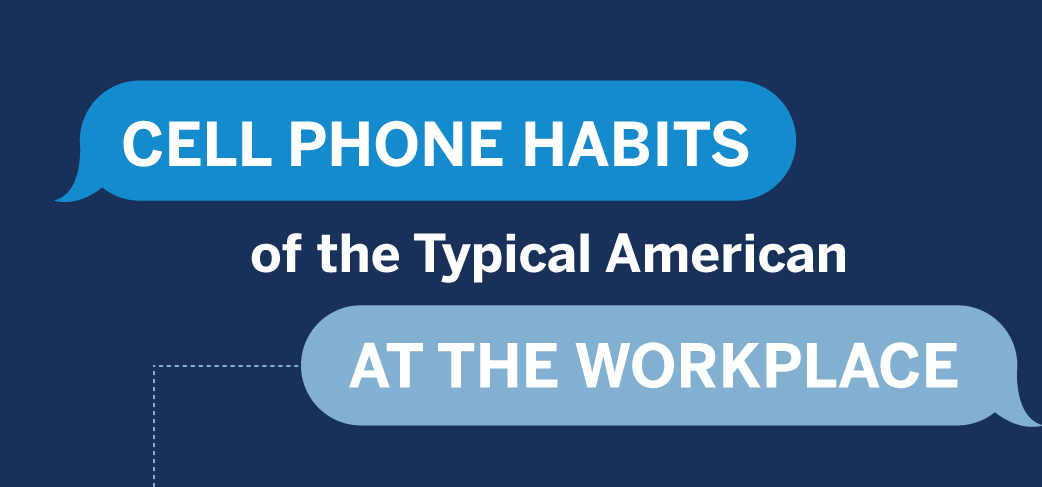Home


Resource Center
Estimated Reading TIme: 7 minutes
Cell phones are now a constant presence in everyday life.
They’re the devices that keep us connected to our friends, family, and coworkers. They’re our go-to source for entertainment. With our constant connectivity, our cell phones are also how we stay informed about everything in our personal lives. And throughout the world at large.
Recent statistics reveal there are 378.2 million cell phones being actively used by Americans. This is quite an amazing number. Especially once you stop to consider the US Census Bureau’s population clock estimates the nation’s current population to be 328.5 million.
It’s one thing to know how many cell phones are being actively used by Americans. But just how are those cell phones being used? And what are the cell phone habits of the typical American at the workplace?
To better understand what factors are most important to our customers when it comes to mobile device connectivity, we conducted a study of the nation’s cell phone habits.
Our Methodology
Conducted in December 2018, our survey comprised responses from 1,000 participants across the United States—from age 18 to 65+. We posed a total of seven questions, encompassing cell phone use in both work- and personal-use scenarios. Our research was gathered using websites through our partnership with the Google Surveys Publisher Network.
Download our Infographic with the Top Most Surprising Statistics Here.
Can’t Live Without It
On any given day, it’s not uncommon to look around and see someone completely engrossed by their cell phone. Perhaps we identify ourselves as that captivated cell phone user. But just how obsessively do most of us check our cell phones on a daily basis, even when at work?
1) How much time do you spend checking your cell phone during each work day (Mon – Fri) for work-related reasons?
When asked, nearly half (47.9%) spend one hour per day or more checking their cell during each work day (Mon-Fri) for work-related reasons.
Breaking this down by age group, we discover some notable differences:
- 55.6% of people aged 18-24 spend one hour or more checking their phones during each work day (Mon-Fri) for work-related reasons.
- This percentage actually jumps to 63.7% among people aged 25-34. This number then goes back down to 51.0% for people aged 35-44.
- Unsurprisingly, the 55+ age groups spend less than one hour each work day checking their phones for work-related reasons.
2) How much time do you spend checking your cell phone during each work day (Mon-Fri) for personal reasons?
When asked, more than half (50.6%) spend one hour per day or more checking their cell during each work day (Mon-Fri) for personal reasons.
Again, we observe some notable differences among the age groups surveyed:
- On average, 45.5% of men check their cell phones one hour or more each work day (Mon-Fri) for personal reasons in contrast to over half (55.3%) of the women surveyed.
- A whopping 68.7% of people aged 18-24 spend one hour or more checking their phones during each work day for personal reasons.
- Surprisingly, at 71.6% an even higher percentage of those aged 25-34 spent one hour per day or more checking their cell during each work day. Then, just above the average at 55.2% among those aged 35-44.
- As expected, the majority of older age groups spend less than one hour each work day checking their phones for personal reasons. 65.3% among those aged 55-64 and up to 70.0 % for people ages 65+.
Connectivity Issues Interrupting Work
Our ability to stay connected and get the best use from our cell phones is wholly dependent on the reliability of our cellular signal. Regardless of mobile carrier network, most everyone has experienced a dropped call or weak signal. But how prevalent of an issue does this present for business people?
3) How often have you lost a deal/client or missed a key business decision/sale because of poor cellular connectivity?
When asked, nearly one-third (30.2%) of everyone surveyed cited they had lost a deal/client or missed a key business decision/sale because of poor cellular connectivity. This average percentage remained consistent across genders and all age groups surveyed.
4) How often have you had cell phone connectivity issues that have interrupted your work on a daily to yearly basis?
More than half (51.7%) of respondents cited having had cell phone connectivity issues that interrupted their work on a daily to yearly basis.
- This number increased slightly to 57.4% for those aged 18-24 and 56.2% for those aged 25-34 who reported having had cell phone connectivity issues that interrupted work.
- Just above the average, 52.5% among those aged 35-44 have had cell phone connectivity issues interrupt their work and 55.5% among those aged 45-54.
- Relying more on landlines than other generations, 43.4% of those aged 55+ reported cell phone connectivity issues that interrupted work; notably below the 51.7% average.
5) Have you ever missed out on an important life event (e.g. anniversary, date) for an urgent work call or email?
Just over one-fifth (20.3%) of everyone surveyed have missed out on an important life event for an urgent work call or email. This number jumps to 27.1% for people aged 25-34.
- At 22.7% among those aged 18-24, our youngest sample group is the second highest for missing out on an important life event due to an urgent work call or email.
- Those aged 45-54 are just below the average at 20.1 % who missed out on an important life event.
- The numbers stay below average for the remaining groups with 19.3% among those aged 35-44, then 14.7% among those aged 55-64 and 16.4% among those aged 65+.
A Captive Audience
Our need to stay connected to our cell phones knows no boundaries. In fact, according to a Business Insider study, a staggering 90% of 18-29 year-olds sleep with the smartphones in or right next to their bed. But how does work-related cell phone use influence those user habits?
6) Have you ever taken a work call or read/answered emails in the bathroom?
More than half (51.5%) of respondents admitted to taking a work call or reading/answering emails while in the bathroom.
- Among the age groups, those aged 25-34 ranked highest with 64.5% admitting to taking a work call or reading/answering emails while in the bathroom.
- At 56.4%, those in the 45-54 age group ranked second highest.
- As for the other groups in the study, 47.1% among those aged 18-24 admitted to taking a work call or reading/answering, along with 51.7% among those aged 35-44, down back to 46.6% among those aged 55-64, and 36.4% among those aged 65+ respectively.
A Matter of Preference
It’s a fact—the relevance of landlines and desk phones is on a constant decline. Research shows that in 2004, more than 90% of U.S. households had a landline phone. Today, the ownership of a landline phone is below 50%. Across age groups, what is the preferred phone type at the office?
7) If you had a choice between bringing your own device (BYOD) or using a landline/desk phone provided by your workplace, which would you prefer?
More than half (54.6%) of respondents reported they would prefer to BYOD instead of using a landline/desk phone provided by their workplace.
- This number jumps to 68.7% for those aged 18-24 who prefer to BYOD, not at all surprising when considering how tech-savvy this generational segment is.
- Not far behind, 59.7% of those aged 25-34 prefer to BYOD in the workplace, then 52.1% among those aged 35-44 and back up to 56.3% among those aged 45-54.
- What may come as a surprise is that more than half (51.8%) of seniors aged 55-64 cite a preference to BYOD in the workplace—in contrast to perceived traditional preferences.
- Rounding out the numbers, 38.8% among those aged 65+ prefer to BYOD.
Solving For Your Cellular Connectivity Issues
Cell phones have completely transformed the way we do business. Our ability to call, text, and access the internet is more than a convenience or luxury. It’s often a source of our wellbeing.
Whether it’s manufacturing or healthcare, retail or hospitality, sales or management—or virtually any industry in between—cell phones and mobile devices are also critical to job performance at almost any organization. The availability of reliable cell signal can mean increased productivity, greater customer satisfaction, improved security, and so much more.
Taking your own circumstances into consideration, have cellular connectivity issues in your building ever hampered your ability to conduct business? If so, we can help.
At WilsonPro, we are dedicated to solving the unique cellular connectivity issues experienced by modern businesses. We provide custom amplifier systems to enhance existing cellular signal in a variety of commercial settings—from retail office buildings, corporate high rises, and medical centers to rural schools, production warehouses, and oil exploration worksites.
ABOUT WILSONPRO
WilsonPro is one of the nation’s leading manufacturers and innovators of commercial cellular signal enhancement technology. Our product line of professional-grade cellular amplifiers is designed to ensure you get the best cell signal possible—regardless of which major U.S. mobile carrier network you use—overcoming connectivity challenges in buildings beyond 5,000 sq. ft.
Contact us today to learn more about how we can help with your cellular connectivity issues.

